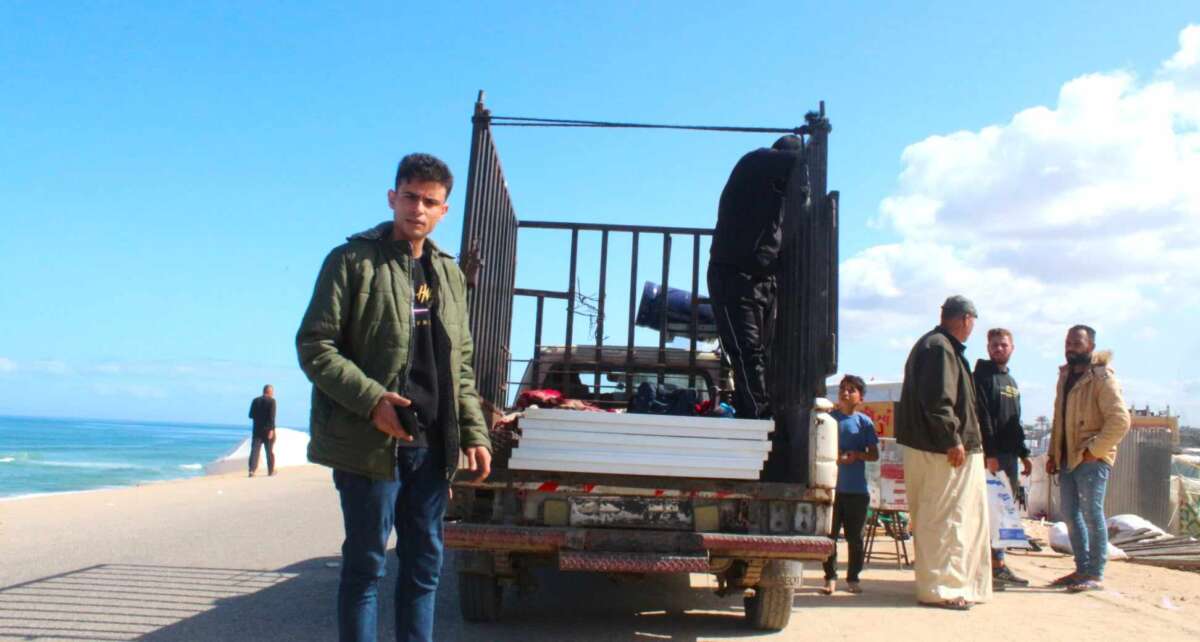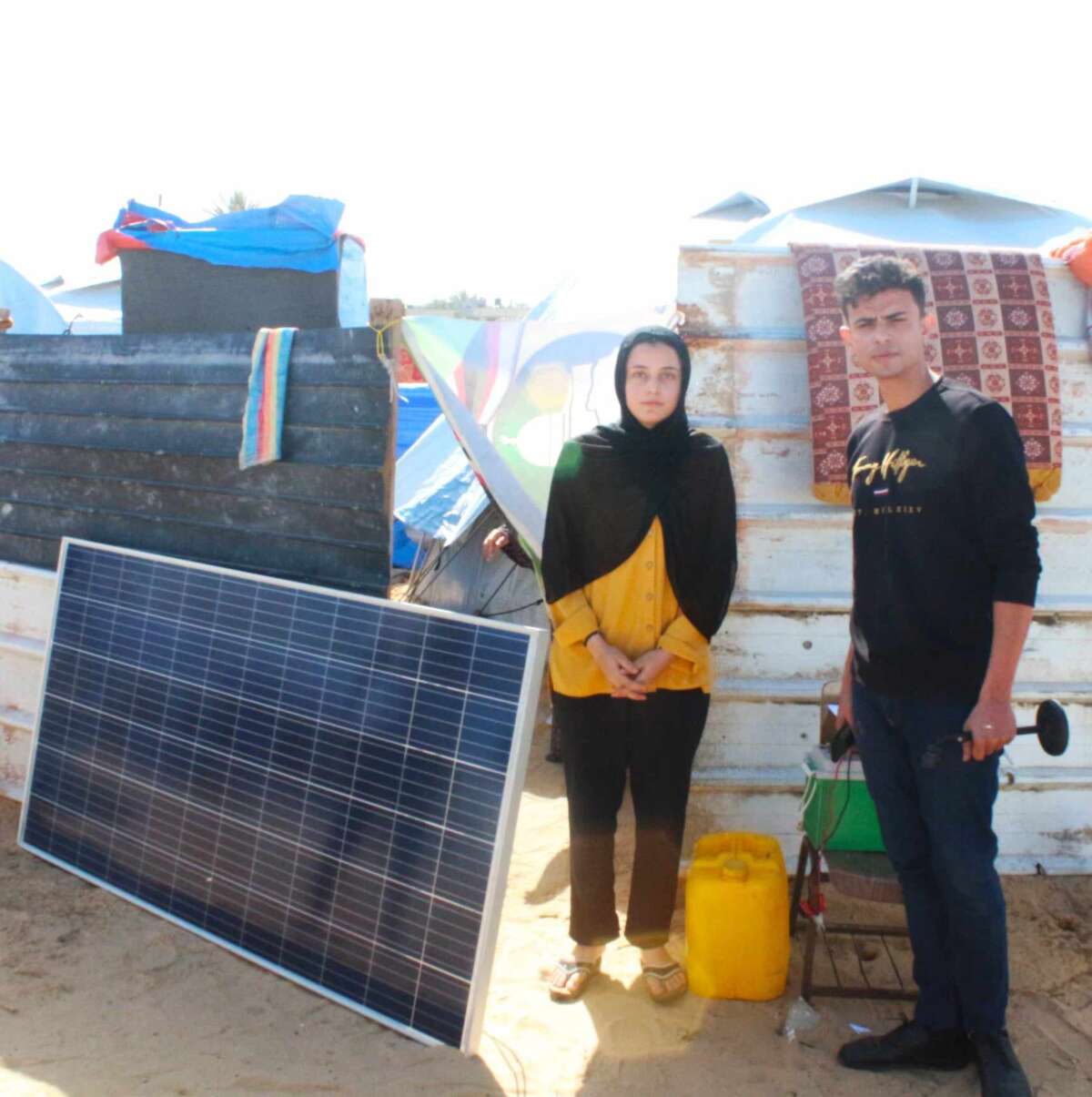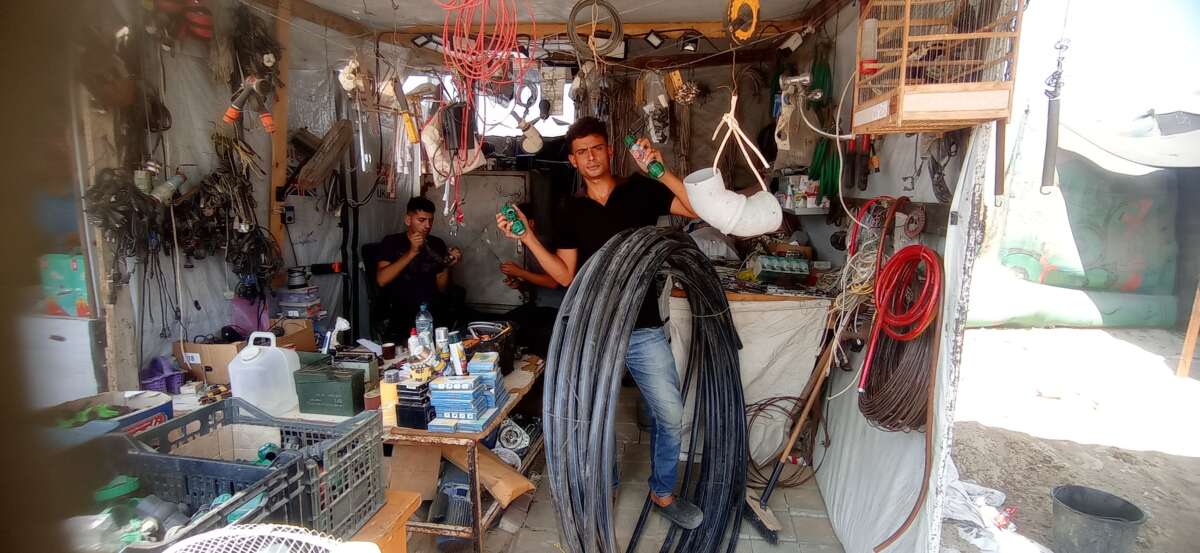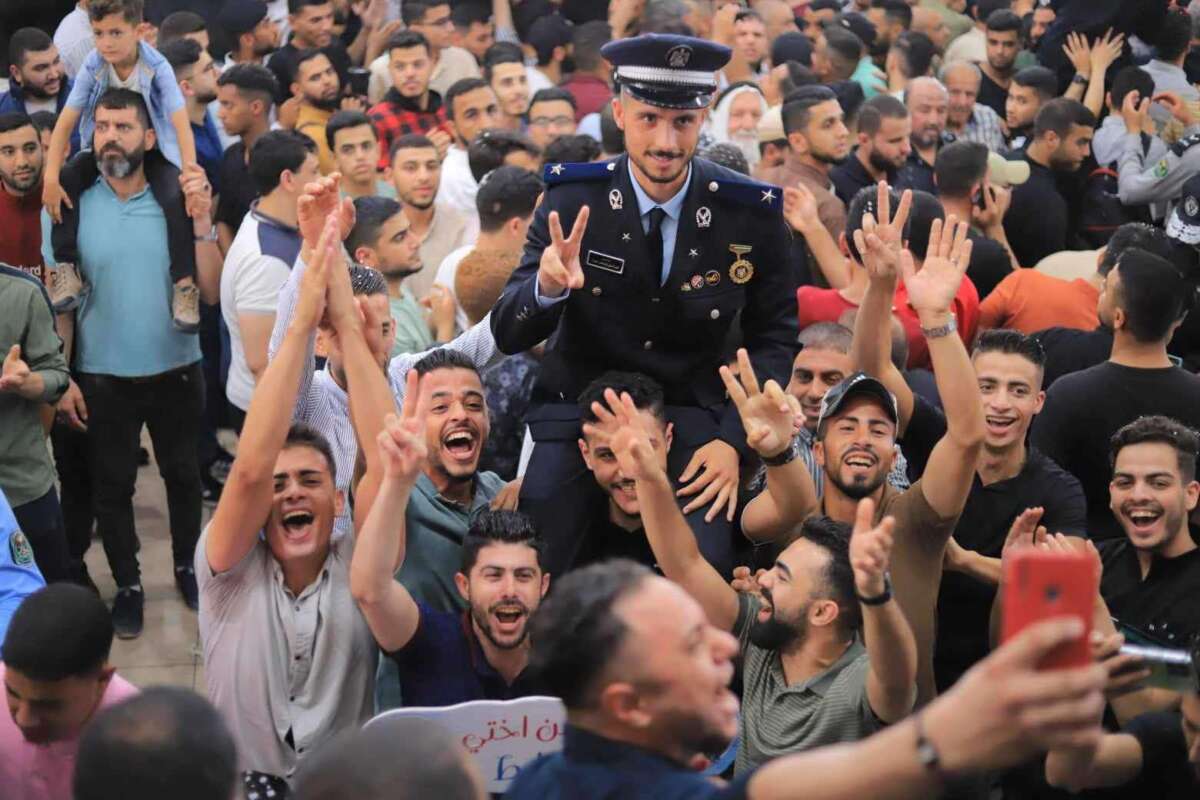Part of the Series
Struggle and Solidarity: Writing Toward Palestinian Liberation
Before October 7, 2023, I was A. Mansour. Afterward, I’m still A. Mansour, according to my ID, but I can’t recognize this new version of myself.
Displaced by bombing from my home in eastern Rafah, a city in the southern Gaza Strip, to the al-Mawasi neighborhood of Khan Younis, I have lost so many loved ones to Israel’s attacks over the past year: I am mourning 60 family members, including my friend and cousin Mahmoud. My beloved younger brother Nour, who also went by the nickname of Ahmed, has been missing since we evacuated our home in Rafah in May. I do not want to acknowledge that he is likely dead as well.
Back in March 2023, Mohammed Ghazi, one of my closest friends, sent me a message late at night: “Hi … I’m by your house.” I was surprised. Mohammed was visiting me out of the blue! Smiling, I replied, “You must be kidding?” I hadn’t been meeting friends much because I was busy applying for jobs and master’s degree scholarships. Still, I eagerly went downstairs to open the door for Mohammed and welcomed him in.
“What’s the value of our lives?” he asked.
Mohammed and I stayed up all night wrestling with this question, each of us dreaming about our possible futures — me in program management, him in laboratory science. But unfortunately, we had no answer to how we’d get there. It had been more than two years since our graduation, and we’d applied for countless jobs and scholarships, but had been rejected every time. Without a visible way forward, I could not imagine one day getting married, buying my aunts gifts or enjoying any of the other pleasant details of life that seem simple for most people outside Gaza. I could only exist.
On the night of October 6, 2023, Mohammed called me again. I vividly remember him saying, “We need a miracle!” We thought life couldn’t get much worse. We were wrong.
The day before the genocide began, my life felt incomplete, but at least I still had my home, my family and my friends.
Before October 7, 2023, I still had my brother, Nour, who was not just my sibling but also my best friend. The last thing he said to me on May 5 of this year, as we faced an order to evacuate from our home in Rafah, was, “I will follow you tomorrow.” He stayed behind to collect more of our belongings. He promised to meet me in al-Mawasi, where we sought shelter. But tomorrow came, and many tomorrows followed. To this day, we don’t know what happened to him.

I remember Nour telling me, “You have to stand by my side because you’re my older brother. I need your help to secure my future.” Although he had a job as a police officer, the pay was extremely low (only the equivalent of $210-$315 a month). I had worked to finance his studies at the police college, and he trusted that if any member of our family had the chance for success, it was me. His words touched me, but I didn’t know how to respond. I wanted to help him, to help my entire family and to help myself. But I couldn’t. I really couldn’t.
A few days into the genocide, Nour entered my room, saying: “There’s nothing left to eat in the kitchen. We must do something for the family.”
No one in the family had savings left. The situation was growing more desperate by the minute. I replied: “What can we do? Even the markets are running out of food.”
I suggested we check the neighborhood shops to see if anyone would give us food on credit. We immediately went out, knocking on the doors of every market. But everyone said, “I’m saving the goods for my family. And anyway, I can’t sell on credit.” Nour and I walked home, our eyes welling with tears. We had no idea what to do next.

We reached our home empty-handed. I wasn’t just depressed because we had no food; I was devastated because I had failed in front of my brother, the one who looked up to me like a superhero.
The war has broken me in ways I didn’t think possible. But it also pushed me toward action — and my brother followed my lead.
Nour opened our grandfather’s house to displaced families fleeing northern Gaza. We agreed to house up to seven families. Water was their most urgent need, so I began fundraising to buy bottles of it. That led to an initiative I co-founded called Roots (supported by an American mentor), that has supplied families with clothing and built a clay stove for one woman so she could bake bread for herself and others.
I have lost so many loved ones to Israel’s attacks over the past year: I am mourning 60 family members, including my friend and cousin Mahmoud.
Another dire need is electricity to charge phones and appliances like refrigerators, so what little food we had won’t spoil so fast. With the support of We Are Not Numbers and the Middle East Children’s Alliance, I joined a team that secured solar panels for needy families. I slowly began to feel that maybe I still had a purpose for my life, despite my inability to protect my loved ones. I began to find my way to an answer to the question Mohammed and I had pondered: “What is the value of my life?”
Still, I’ve lost so much. Can you imagine losing 60 family members in one year? My cousin Mahmoud and my brother Nour were two of my closest friends. Both helped me with my volunteer initiatives, and now, I am left carrying the burden myself.
I’m confused about who I am. I know my value is tied to helping others, and thus making an impact on the world. But I struggle to smile. There’s an emptiness inside me that echoes with the memories of everyone I have lost. Still, I keep working. I work because I can’t see people suffering and do nothing. I work because I have no other option.

My father’s friend, Ibrahim Abu Amer, came to visit us the other day. He used to come sit in our tent with me and Mahmoud while we did our volunteer work. Ibrahim was there to extend his condolences on Mahmoud’s murder, just a few weeks ago. He sat in the same place he always did. But this time Mahmoud was gone. I looked at him and asked, “How am I supposed to accept all this trauma?”
Everything has changed so fast, and I don’t know how to process it all. But I must accept that the person I am today is not the person I was yesterday.
The only thing that keeps me alive is the scholarship I’ve been granted to a major university in Washington, D.C. I was supposed to start my courses in September, but the Egyptian crossing out of Gaza remains closed. Fortunately, the university said it will hold my spot until I can finally journey out. Sometimes, I think that day will never come. But I hang on to the conviction that it will.
I will survive this genocide, and I will keep moving forward — not only to rediscover who I am, but to define the value of my life in the face of all that has been lost.
Before Midnight: Last Chance to Have Your Gift Matched!
Before midnight tonight, all donations to Truthout will be matched dollar for dollar up to $15,000! Thanks to a generous supporter, your one-time gift today will be matched immediately. As well, your monthly donation will be matched for the whole first year, doubling your impact.
We have just a few hours left to raise $15,000 and receive the full match.
This matching gift comes at a critical time. As Trump attempts to silence dissenting voices and oppositional nonprofits, reader support is our best defense against the right-wing agenda.
Help Truthout confront Trump’s fascism in 2026, and have your donation matched now!
